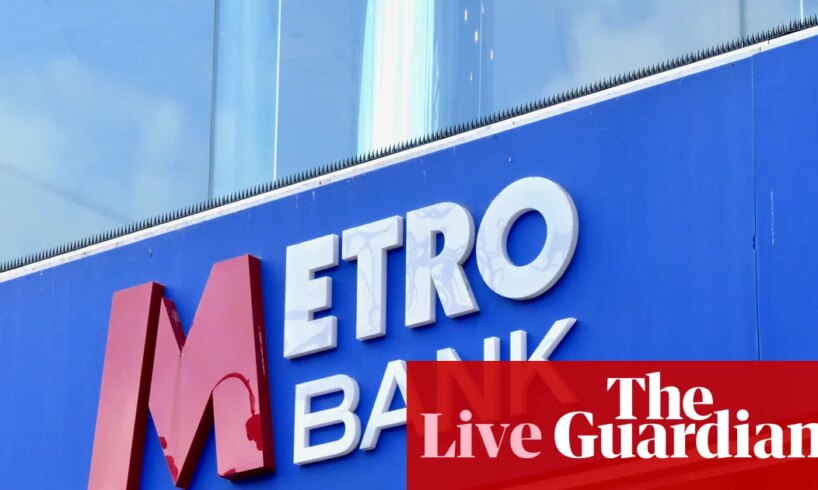
Metro Bank customers hit by payment problems
Customers of Metro Bank have been hit with problems with its payment services, with some alarmed to see they now apparently have a negative balance.
The glitch, reported this morning, left some customers unable to make or receive payments.
One customer has told Metro that their account is showing -£909, warning they have entered an unauthorised overdraft.
Another has reported that transactions have been duplicated, putting them into a negative balance.
Metro has claimed that the issue has now been resolved, saying:
Earlier this morning, we experienced a short delay affecting our inbound and outbound payments. This has now been resolved, and customers can currently make payments as usual. Some customers may see delays while we process these earlier payments and balances may still be showing inaccurately. We are prioritising this and working hard to minimise impact. We apologise for any inconvenience.
Metro customers, though, are disputing that it has been fixed.
Not fixed at all is it though? having the bollocks to put “it’s been resolved” is beyond a joke i’m still sitting with minus in my account. Compensation must be in order, I’m never using Metro again after this.
— Josh Gallagher (@JoshGallagherrr) October 7, 2025
three hours after this tweet, and seven hours after I initially called Metro, the £600 that was taken from my account STILL hasn’t been returned.
couldn’t go to work.
can’t pay my bills.
couldn’t even feed the dog.
is this how you conduct business @Metro_Bank? https://t.co/edDQSVojtp
— Republicurious? (@republicurious) October 7, 2025
Metro’s Service Status page shows that its stores and telephone banking operations are busier than usual.
Share
Updated at 14.56 CEST
Key events
Show key events only
Please turn on JavaScript to use this feature
This chart, from Downdetector, shows how reports of problems at Metro Bank began around 6am this morning, peaking just before 9.30am.
Photograph: DowndetectorShare
Metro Bank customers hit by payment problems
Customers of Metro Bank have been hit with problems with its payment services, with some alarmed to see they now apparently have a negative balance.
The glitch, reported this morning, left some customers unable to make or receive payments.
One customer has told Metro that their account is showing -£909, warning they have entered an unauthorised overdraft.
Another has reported that transactions have been duplicated, putting them into a negative balance.
Metro has claimed that the issue has now been resolved, saying:
Earlier this morning, we experienced a short delay affecting our inbound and outbound payments. This has now been resolved, and customers can currently make payments as usual. Some customers may see delays while we process these earlier payments and balances may still be showing inaccurately. We are prioritising this and working hard to minimise impact. We apologise for any inconvenience.
Metro customers, though, are disputing that it has been fixed.
Not fixed at all is it though? having the bollocks to put “it’s been resolved” is beyond a joke i’m still sitting with minus in my account. Compensation must be in order, I’m never using Metro again after this.
— Josh Gallagher (@JoshGallagherrr) October 7, 2025
three hours after this tweet, and seven hours after I initially called Metro, the £600 that was taken from my account STILL hasn’t been returned.
couldn’t go to work.
can’t pay my bills.
couldn’t even feed the dog.
is this how you conduct business @Metro_Bank? https://t.co/edDQSVojtp
— Republicurious? (@republicurious) October 7, 2025
Metro’s Service Status page shows that its stores and telephone banking operations are busier than usual.
Share
Updated at 14.56 CEST
Investors have been piling into gold-backed funds in recent weeks, helping to push bullion to a series of record highs.
The World Gold Council has reported that global physically backed gold exchange traded funds (ETFs) recorded their largest monthly inflow in September, resulting in the strongest quarter on record.
Their data shows that $26bn flowed into gold ETFs in July-September.
The Council explains:
North American investors led the charge for most of the quarter; at US$16.1bn, the inflow represents the largest Q3 and second largest quarter on record.
European funds also saw hefty buying and registered the region’s second-strongest quarter (US$8.2bn), coming in just US$74mn shy of their record set in Q1 2020. Asia buying slowed during the quarter (US$1.7bn), while funds in other regions (US$28.2mn) were relatively flat.
A chart showing inflows to gold ETFs Illustration: World Gold Council
Why? They point to “ongoing trade, policy, and geopolitical risks”, which don’t appear to be abeting, as well as persistent dollar weakness.
They also suggest that “continued stagflation fears in the UK” could be another key factor attracting gold ETF inflows.
Share
Updated at 14.25 CEST
Back in the markets, the pound has dipped to its lowest level in over a week against the US dollar.
Sterling has slipped by almost a cent today, touching $1.3389, the lowest since 29 September (last Monday).
That’s mainly due to dollar strength, though, point out Fiona Cincotta, senior markets analyst at City Index:
The US dollar is rising, boosted by the weakness of the yen and the euro due to political and fiscal concerns in France and Japan.
Share
Business and Trade Secretary Peter Kyle has welcomed this morning’s news that JLR will resume some manufacturing operations tomorrow.
Kyle says:
“This is very welcome news for workers and suppliers, but I know many are still under pressure, particularly further down the supply chain.
My focus will remain on helping JLR resolve this cyber incident, making further progress towards restarting production, and supporting the long-term health of our automotive supply chain.”
Share
Unsurprisingly, Jaguar Land Rover’s sales have tumbled in the last quarter due to the shutdown triggered by its cyber-attack.
JLR has reported that its retail sales in the last quarter fell by 17% to 85,495 units in the three months to 30 September. Wholesale deliveries fell by 24%.
JLR says:
Volumes reduced during a challenging quarter, reflecting production stoppages since the start of September resulting from the cyber incident, the planned wind down of legacy Jaguar models ahead of the launch of new Jaguar and incremental US tariffs impacting JLR’s US exports.
The carmaker adds that the UK was particularly impacted by the planned wind down of legacy Jaguar models and the cyber incident, which halted production for the last five weeks (with a partial restart now set for tomorrow).
JLR reports:
Compared to the prior year, retail volumes for the second quarter were down in all markets, comprising the UK (-32.3%), North America (- 9.0%), Europe (-12.1%), China (-22.5%), MENA (-15.8%) and Overseas (-4.1%)
Share
Emily Sawicz, director and industrials senior analyst at consultancy RSM UK, has warned that the European Commission’s proposal to impose a 50% tariff on steel imports worldwide poses “a significant threat to the UK steel industry”.
Sawicz explains:
The EU accounts for around 75% of UK steel exports, so these tariffs risk cutting off access to the UK’s largest and most strategically important market at a time when the sector is already under pressure from global competition and rising energy costs.
“Despite the UK government securing quarterly tariff-free quotas for certain steel categories, there remains uncertainty around which products are covered and how long these exemptions will last. This uncertainty will create a ripple effect across other industries including construction, automotive, real estate and energy, all of which rely on stable supply chains and access to raw materials.
In addition, while steel accounts for just 0.1% of UK production, it is strategically important for overall productivity, particularly in growth-driving industries responsible for delivering housing and infrastructure.
Share
UK steel unions slam EU tariff plan
Lisa O’Carroll
The UK steel workers union has hit out against EU proposals to introduce a 50% tariff on foreign imported steel as part of a bloc-wide effort to save their own industry in the face of competition from China and Donald Trump’s 50% tariffs (see previous post):
Alasdair McDiarmid, assistant general secretary at steelworkers’ union Community, said:
“Given that around 80% of the UK’s steel exports go to Europe, the new measures proposed by the EU represent an existential threat to our industry, as well as the thousands of jobs and communities it supports right across the country.”
The plans for tariffs will be announced by the EU trade and industry commissioners, Maros Sefcovic and Stéphone Séjourné after 4pm today.
While the UK was spared the 50% tariff on steel imports Trump imposed in June, the UK steel industry is also struggling against cheap Chinese imports and a new 25% tariffs on steel imports imposed by the US president before June.
McDiarmid said the UK government was “acutely aware of the grave risks the EU proposal poses” and called on it to urgently negotiate a country-specific quota.
Sectoral tariff-free quotas for foreign imports can result in de facto blockages, as British farmers can testify.
Negotiators to the UK-US tariff deal revealed earlier this year that the quota for third country imports of beef didn’t work as it was filled up by Brazil and others in South America.
They were able to use warehouses in Mexico to transport beef quickly to the US filling up the US quota and beating British farmers who needed more time to ship their own beef across the Atlantic.
Under the UK-US deal, British farmers now have UK-specific quota for beef imports.
Share
Updated at 12.13 CEST
EU to raise tariffs on foreign steel imports
Lisa O’Carroll
The EU is to take a leaf out of Donald Trump’s playbook and increase tariffs on foreign steel imports as the local industry, particularly in Germany, is threatened with “collapse” in the face of cheap Chinese imports and 50% punitive tariffs imposed by the US in June.
In a major shift in policy, the European Commission is expected to propose doubling the current 25% tariff to 50% on foreign steel while at the same time drastically reducing the current quota for duty-free imports.
The bloc’s industry commissioner Stéphane Séjourné in Strasbourg said this morning:
“The European steel industry was on the verge of collapse – we are protecting it so that it can invest, decarbonise, and become competitive again.”
He insisted the move was not the same as Trump’s blunt 50% steel tariff that applies, with some exceptions such as the UK, across the globe.
The EU tariff, in contrast, will only apply after a quota of foreign imports has been filled, with all foreign imports below that duty-free.
Alongside the proposal being presented after 4pm in Strasbourg on Tuesday, the EU is seeking a “metals alliance” with the US to ring-fence their respective economies from over-capacity.
As the 27-nation EU pushes ahead with decarbonising industry, steel is critical for renewable energy equipment, from solar panels to wind turbines, and for electric cars.
“The European Union needs to act now, and decisively, before all lights go out in large parts of the EU steel industry and its value chains,” said industry group Eurofer’s president Henrik Adam.
Share
Updated at 11.48 CEST
UK investors quit equity funds at record pace as they flee sky-high stock markets
UK investors have pulled a record amount of cash out of equity funds in the last three months, fretting that valuations have soared too high, new data shows.
Calastone, the largest global funds network, has reported this morning that investors “ran scared of sky-high stock markets” in the third quarter of this year.
Its data shows that UK investors withdrew £1.20bn of their equity-fund holdings in September, taking the total in the third quarter of 2025 to £3.64bn, the worst of any three-month run on Calastone’s 11-year record.
Rather than holding equities, investors have been putting money into bonds and money market funds, which are perceived as safer than shares – at a time when many stock markets (including London, New York and Toyko) have been hitting record highs.
Calastone reports that every major equity-fund sector except European-focused funds saw outflows in September, adding:
Global equity funds suffered an unprecedented fourth consecutive month of net selling (£203m), while North American funds shed £146m. Outflows from Asia-Pacific funds extended to their 29th consecutive month (£209m), while funds focused on the UK shed £691m.
China, Japan, emerging markets, small cap and sector funds all saw outflows too. European funds stood out, as investors added a net £203m to their holdings.
Photograph: Calastone
Edward Glyn, head of global markets at Calastone, reports that “outflows are on the rise again” from UK funds, explaining:
Doubtless, seeing the UK market reach record levels while still not looking expensive has given some sellers pause for thought. But the doom loop of negative commentary on the UK economy with its dire fiscal position, soaring credit spreads, lack of growth and impending tax rises may now be winning out.
Share
E-bike operator Lime boosts turnover
Lauren AlmeidaLime rental bikes parked on a pathway at Eel Brook Common in Fulham, London. Photograph: Kevin Coombs/Reuters
The electric bike sharing start-up Lime has reported a 75% rise in turnover to £111.3m in the UK, as the popularity of its green bikes and scooters continues to grow.
While more people are hopping on Lime bikes, the UK arm of the company reported a 40% drop in pre-tax profit to £1.7m in its 2024 financial year, which was largely driven by a 79% rise in its administrative expenses.
Lime bikes have become an increasingly popular mode of transport in London, although the company has come under fire from local authorities over bikes being discarded on the street. In some areas, there are geofences that stop bikes from being parked and freeze their electrical functions to discourage people from cycling through.
Lime, which is based in San Francisco, operates fleets of e-bikes and scooters in 280 cities around the world. Over the summer there were reports that it was considering a stock market floatation, with estimates suggesting that it could be valued at about $500m.
Last year, chief executive Wayne Ting told the Sunday Times that Lime was “ready” for a float in New York, but that the IPO market at the time was “largely shut”.
Share
Source





